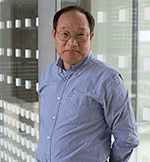
With a new $20 million federal grant, UC Merced becomes part of a multi-institutional research collaborative to develop artificial intelligence — or AI — solutions to tackle some of agriculture’s biggest challenges related to water management, climate change and integration of new technology into farming.
The new institute is one of 11 launched this year by the National Science Foundation (NSF) and among two funded by the U.S. Department of Agriculture-National Institute of Food and Agriculture. The newly announced AgAID Institute is shorthand for the collaborative USDA-NIFA Institute for Agricultural AI for Transforming Workforce and Decision Support.
The AgAID Institute features four core institutions: UC Merced; Washington State University (WSU), the lead campus; Oregon State University; and the University of Virginia. The AgAID Institute bolsters UC Merced’s already strong focus on ag-tech solutions for sustainable food systems in California and beyond.
 “This is only the second round of AI centers the NSF has funded, so we’re really honored to be contributing to this important and cutting-edge research effort,” environmental engineering Professor Joshua Viers said. Viers is the lead principal investigator from UC Merced and the campus director of the Center for Information Technology Research in the Interest of Society (CITRIS) and the Banatao Institute, which has been advancing ag-tech solutions for the San Joaquin Valley broadly. “We’ll be working to leverage computational knowledge to arrive at actionable decisions for farmers and water managers, and we’ll be the application test beds for much of what is developed at the other core institutions.”
“This is only the second round of AI centers the NSF has funded, so we’re really honored to be contributing to this important and cutting-edge research effort,” environmental engineering Professor Joshua Viers said. Viers is the lead principal investigator from UC Merced and the campus director of the Center for Information Technology Research in the Interest of Society (CITRIS) and the Banatao Institute, which has been advancing ag-tech solutions for the San Joaquin Valley broadly. “We’ll be working to leverage computational knowledge to arrive at actionable decisions for farmers and water managers, and we’ll be the application test beds for much of what is developed at the other core institutions.”
Much of that testing will be done at UC Merced’s new experimental smart farm, a 40-acre site adjacent to campus that is in the planning stages.
"Not only are we building the future in the heart of California, but we are doing it in a way that speaks to our commitment to innovation in research and education that uplifts our region and results in a new generation of leaders for the Valley."
While traditional AI development involves scientists making tools and delivering them to end-users, the AgAID Institute will involve the people who will use the AI solutions — from farmers and workers to policy makers — in their development. This “adopt-adapt-amplify” approach ensures solutions are practical and more likely to be adopted. The researchers will also work to create solutions that can adapt to changing environments and that amplify productivity by combining human skills and machine capabilities to be more effective than either would be alone.
“People are very much part of the agricultural ecosystem. It’s not just plants growing. Humans manipulate crops on a daily basis and make complex decisions, such as how to allocate water or mitigate the effects of an incoming storm,” said Ananth Kalyanaraman, a WSU computer science professor and AgAID Institute director. “We aim to partner human knowledge with AI tools in a way that amplifies the end outcomes where the whole is greater than the sum of its parts.”
 The AgAID Institute will be a multi-disciplinary, collaborative effort involving faculty and scientists with expertise in a diverse range of areas in computer science, agriculture and agricultural outreach. In addition to the four core institutions, the collaborative includes Carnegie Mellon University and Kansas State University, and in an effort to train the next generation of educators and farm managers, UC Merced will work closely with other minority-serving institutions such as Heritage University and Wenatchee Valley College. Private sector partners include IBM Research and the start-up innov8.ag.
The AgAID Institute will be a multi-disciplinary, collaborative effort involving faculty and scientists with expertise in a diverse range of areas in computer science, agriculture and agricultural outreach. In addition to the four core institutions, the collaborative includes Carnegie Mellon University and Kansas State University, and in an effort to train the next generation of educators and farm managers, UC Merced will work closely with other minority-serving institutions such as Heritage University and Wenatchee Valley College. Private sector partners include IBM Research and the start-up innov8.ag.
At UC Merced, School of Engineering professors Reza Ehsani, Jian-Qiao Sun, John Abatzoglou and Josué Medellín-Azuara will all be co-investigators and part of the Institute, as will social scientist Leigh Bernacchi, Ph.D., the CITRIS program director.
With this grant, NSF has made a $220 million investment in AI-based collaborations, building on the first round of seven AI Institutes funded in 2020.
The goal is to develop AI-based technologies that bring about a range of advances: helping older adults lead more independent lives and improving the quality of their care; transforming AI into a more accessible “plug-and-play” technology; creating solutions to improve agriculture and food supply chains; enhancing adult online learning; and supporting underrepresented students from elementary to post-doctoral STEM education to improve equity and representation in AI research.
 Led by NSF and in partnership with USDA-NIFA, the U.S. Department of Homeland Security (DHS), Google, Amazon, Intel and Accenture, the AI Institutes will act as connections in a nationwide network pursuing transformational advances in a range of economic sectors, and science and engineering fields — from food-system security to next-generation edge networks.
Led by NSF and in partnership with USDA-NIFA, the U.S. Department of Homeland Security (DHS), Google, Amazon, Intel and Accenture, the AI Institutes will act as connections in a nationwide network pursuing transformational advances in a range of economic sectors, and science and engineering fields — from food-system security to next-generation edge networks.
“AI is an enabling technology that can help us develop the next generation of intelligent farm equipment and implements. These machines could potentially be more efficient, easier to operate and could reduce production costs,” Ehsani said.
For instance, pruning trees is a highly skilled task, but a beginner-level worker could benefit from an AI tool that provides expert guidance to help decide which are the best branches to prune. The task is done better, and the worker starts to learn from the feedback. With a shortage of skilled labor, AI can benefit both the orchard and the worker, bridging a divide between high-skilled and low-skilled workers.
“AI is an enabling technology that can help us develop the next generation of intelligent farm equipment and implements. These machines could potentially be more efficient, easier to operate and could reduce production costs."

